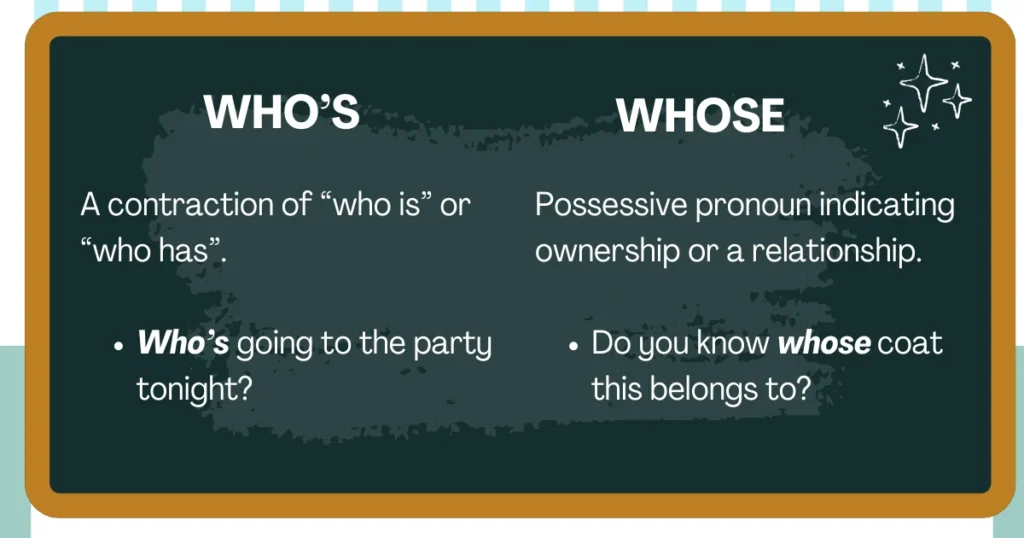Who's vs. whose
If who's vs. whose still gets you mixed up—don't worry, the answer is a matter of a quick lesson in grammar.
Who's vs. whose explained
Whose and who’s are both forms of the interrogative pronoun “who“, (not the World Health Organization, though they have the same letters).
| word | example |
|---|---|
| Whose (possessive pronoun) indicates belonging | Do you know whose book this is? Whose car is parked in my spot? |
| Who’s (contraction, who + is or has) | Have you heard who’s going to be at the party? Who’s been to this restaurant before? |
The contraction “who’s” (who + is/has)
Who’s going to bring the dessert to the potluck this year?
Whose turn is it to do the dishes tonight?
I wonder who’s seen the new movie.
I wonder whose idea it was to paint the house purple.
Whose coming to the party tonight? (Incorrect: should be “Who’s”)
I don’t know who’s dog that is. (Incorrect: should be “whose”)
- [Who + is]: Who’s going to be at the party?; “Guess who’s coming to dinner?
- [Who + has]: Do you know who’s been here before?; she’s someone who’s always been there for me.
How to use whose (possessive)
|
Whose phone is that on the table? |
|
It’s the house whose door is painted red. |
|
Jake, whose sister is an archeologist, is considering studying the subject as well. |
If you can replace “who’s” with “who is” or “who has” and the sentence still makes sense, then “who’s” is the correct word to use. If not, you probably need “whose.”
Why do we confuse who’s and whose?
In review: who’s vs. whose

- Whose is the possessive form of who and asks about ownership or possession.
More confusing words
Practice: Who’s or whose?
______ jacket is this on the chair?
______ coming to dinner tonight?
Do you know ______ car is parked outside?
______ the new teacher in the class?
Can you tell me ______ phone this is?
Word origin
Who: Old English hwā, of Germanic origin; related to Dutch wie and German wer. The interrogative pronoun "who" has been used since Old English times to ask about people or to introduce relative clauses.
Whose: Old English hwæs, genitive of hwā (who). The possessive form has been used continuously since Old English to indicate possession or belonging, maintaining its function through the centuries despite spelling changes.
Who's: The contraction "who's" combining "who" + "is" or "who" + "has" emerged in written English during the 16th-17th century as contractions became more common in English. The apostrophe marks the omission of letters in the contracted form.
FAQs
When should I use "who's"?
When should I use "whose"?
What's the difference between "who's" and "whose"?
How do I check if "who's" is correct?
Why doesn't "whose" have an apostrophe?
What are common mistakes with "who's" and "whose"?
Sources
- Oxford English Dictionary. "Who." Oxford University Press. Date of access 14 Oct. 2025.
- Oxford English Dictionary. "Whose." Oxford University Press. Date of access 14 Oct. 2025.
- Merriam-Webster Dictionary. "Who's." Merriam-Webster, Inc. Date of access 14 Oct. 2025.
- Cambridge Grammar of the English Language. Huddleston, Rodney, and Geoffrey K. Pullum. Cambridge University Press, 2002.
Advertisement








.webp&w=3840&q=75&dpl=dpl_13tcGbrn5BXPQFsQmuQWqib9Y3DN)